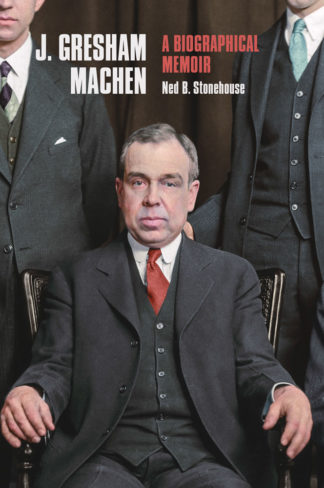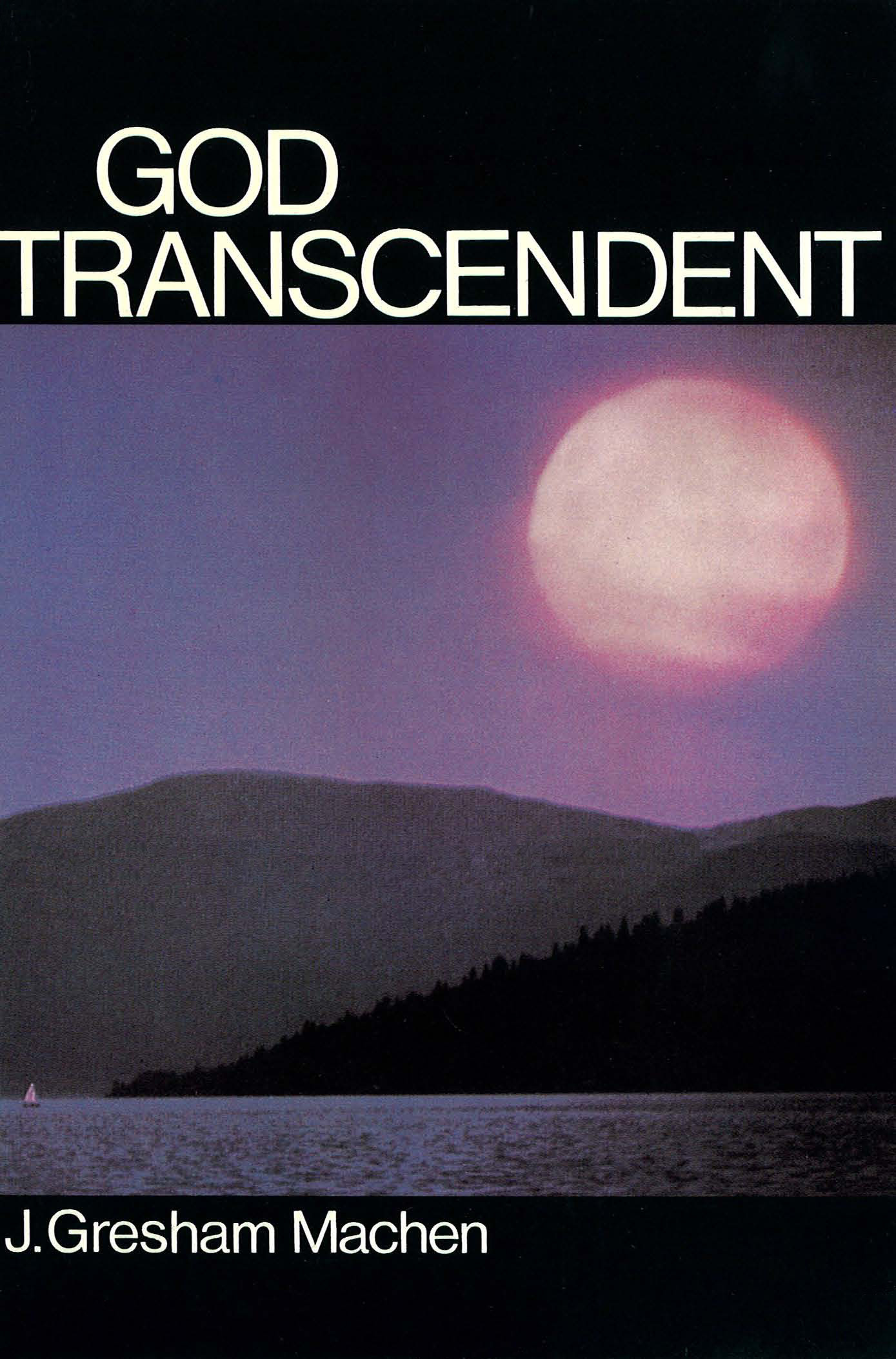The Life We Cannot Live
J. Gresham Machen (1881-1937) was one of the great theologians of the twentieth century. He served as a Professor of New Testament first at Princeton Seminary from 1906 until 1929 when he founded Westminster Theological Seminary in Philadelphia in response to the incursion of modernist theology at Princeton. He travelled widely, preaching and teaching all over the world, exercising an international influence for orthodoxy. He wrote many books and scholarly articles expounding and defending Biblical Christianity. And yet, as he lay dying on New Year’s Eve, 1936, he wasn’t thinking about any of his many and considerable achievements throughout his life. He dictated a telegram to his colleague John Murray in which his last words are recorded, ‘I’m so thankful for [the] active obedience of Christ. No hope without it.’
What did he mean by this? Simply this: that Jesus Christ saves us by living the life of perfect obedience to the law of God that fallen human beings cannot ever live. Of course, he must do more than this—he must also die the death that we deserve to take the punishment for all our sins. It’s not one or the other—both are essential if we are to be saved from hell and gain entrance into heaven. Theologians distinguish between the two by referring to Christ’s keeping the law in our place as his ‘active obedience’ and his dying to atone for our sins as his ‘passive obedience.’
If a J. G. Machen, at the end of a life of godliness, brilliance and faithfulness couldn’t rest on his own righteousness to secure his place in heaven, how much less can you or I. We need a Saviour who has lived the life we cannot live. There is no hope without it.
Just pause and think of what it meant for the Lord Jesus to obey for us, in our place. For thirty years he never once said or did anything wrong. More than that, at every single moment he positively said and did exactly the right thing, in the right way, to the right degree! More than that, his obedience didn’t just extend to his outward actions and words—his inner life was perfectly in line with the law of God. In his thoughts, his feelings, his will, his desires, his reactions, his attitudes, motives and disposition—not once, not for so much as a millisecond, was there even an infinitesimal lapse.
Remember, too, that Jesus wasn’t living closeted away from the corrupting influence of sinful people. He was plunged into the middle of the world, surrounded by and in close contact with sinners. He experienced the weaknesses of a human nature that give temptation extra power. He knew what it was to be tired—weary to the point of exhaustion (so weary, indeed, that he was able to sleep through a windstorm at sea when the boat he was in threatened to capsize!). How often we give in to temptation when we’re tired and our guard is down. Jesus never did.
Jesus knew what it was to be poor—to have barely enough to live on. The offering Mary and Joseph gave in the temple to redeem their firstborn son was the offering prescribed for the very poorest of the land. As an adult he had nowhere to call his own home; he owned nothing but the clothes he wore. And yet never once did he covet anything that belonged to his neighbour or envy anyone.
As a baby, Jesus never once cried in rage or frustration. Think of how young children find it hard to control their emotions and reactions, how they squabble with their siblings and refuse to do what their parents tell them. As a young child Jesus never once lashed out in anger with his fist or his tongue. As he grew older and encountered peer pressure among the other children in Nazareth, never once did he give in and follow the crowd in doing wrong. As a teenager and a young man, when Jesus went through puberty and all the normal, God-given hormones began to surge in his body and new temptations assailed his eyes, never once did he look at any girl or woman with anything but perfect purity. Never once did he show off his developing strength by picking a fight. Never once did he disrespect his mother or Joseph, even when they were in the wrong. When he baffles the professional theologians at Jerusalem at the age of twelve there isn’t even the slightest whiff of pride. When he is being falsely accused, sorely provoked and beaten to within an inch of his life, when he is being mocked and scorned while hanging in physical and spiritual agony on the cross, never once does he do or say or feel anything wrong. Instead he speaks and thinks and feels only grace and compassion and kindness.
Now, ask yourself, ‘Whose record of obedience do you want to trust in for salvation? Yours or Jesus’?’ There is no contest, is there?! To ask the question is to answer it. Think of your performance over the course of your life, from infancy to where you are now. Think over some of the things you’ve done that you shouldn’t have done. And think of the many things you should have done and haven’t. Things you should have said and felt and wanted. The great good news of the gospel is that you don’t have to depend on your performance—we have a Saviour who has done everything that needs to be done. He has fulfilled all the demands of the law of God in our place and on our behalf. He didn’t just die in our place—he lived in our place.
How good it is to know that when God looks at you in Christ, he doesn’t see your shabby catalogue of sins and failures—he sees the pristine life of his beloved Son. He doesn’t see your bad temper, but Christ’s perfect patience and love. He doesn’t see your lusts and fantasies but Christ’s perfect purity and chastity. He doesn’t hear your cruel words, but his Son’s sinless speech.
No wonder this was such an unspeakably great comfort to J. G. Machen as he approached death—as he thought back over his life and as he looked ahead to the judgment seat of Christ. ‘So thankful for the active obedience of Christ. No hope without it.’
* * *
Machen had preached a sermon on the active obedience of Christ on the radio just over a week earlier, so these truths were fresh in his mind. The sermon is included in Machen’s book God Transcendent (Edinburgh: Banner of Truth Trust, 1982). You may also be interested to read the biography of Machen written by his friend and colleague at Westminster, Ned Stonehouse (4th Ed., Edinburgh: Banner of Truth Trust, 2019)
This article was first published on Gentle Reformation and has been reprinted with permission.
Of Futher Interest

J. Gresham Machen
a biographical memoir
Description
As Machen lay dying on New Year’s Eve, 1936, he wasn’t thinking about any of his many and considerable achievements throughout his life. He dictated a telegram to his colleague John Murray in which his last words are recorded, ‘I’m so thankful for [the] active obedience of Christ. No hope without it.’

Description
As Machen lay dying on New Year’s Eve, 1936, he wasn’t thinking about any of his many and considerable achievements throughout his life. He dictated a telegram to his colleague John Murray in which his last words are recorded, ‘I’m so thankful for [the] active obedience of Christ. No hope without it.’

Grace and Glory
Sermons Preached at Princeton Seminary
Description
As Machen lay dying on New Year’s Eve, 1936, he wasn’t thinking about any of his many and considerable achievements throughout his life. He dictated a telegram to his colleague John Murray in which his last words are recorded, ‘I’m so thankful for [the] active obedience of Christ. No hope without it.’
Latest Articles
Finished!: A Message for Easter 28 March 2024
Think about someone being selected and sent to do an especially difficult job. Some major crisis has arisen, or some massive problem needs to be tackled, and it requires the knowledge, the experience, the skill-set, the leadership that they so remarkably possess. It was like that with Jesus. Entrusted to him by God the Father […]
Every Christian a Publisher! 27 February 2024
The following article appeared in Issue 291 of the Banner Magazine, dated December 1987. ‘The Lord gave the word; great was the company of those that published it’ (Psalm 68.11) THE NEED FOR TRUTH I would like to speak to you today about the importance of the use of literature in the church, for evangelism, […]
